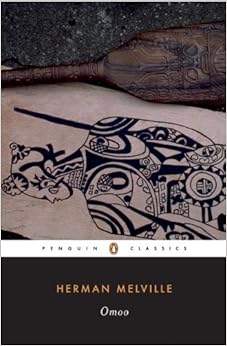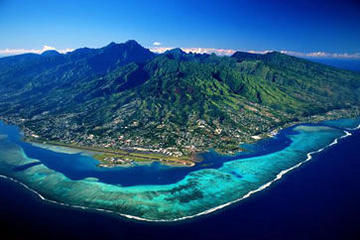"Omoo" de Herman Melville

Omoo n'est pas l'ouvrage le plus connu d'Herman Melville mais il n'en constitue pas moins une pièce importante de son oeuvre. Faisant suite à Typee, son premier livre publié l'année précédente en 1846, il exploite comme lui une période aventureuse de sa vie passée dans les mers et les îles du Pacifique (1). Mais si ce second livre est présenté dans son sous-titre comme "a narrative of adventures in the south seas", il dépasse largement le simple récit autobiographique.
Ne se contentant pas de relater les faits dont il se souvient (n'ayant pas pris de notes) et de commenter ses observations, l'auteur remanie et réimagine en effet son expérience dans un récit très documenté mêlant la réalité à la fiction. Il n'hésite pas ainsi à inventer – avec un talent manifeste - des détails, des événements ou des personnages pour corser son récit, et il ne se prive pas, surtout, d'emprunter aux auteurs contemporains de récits de voyages – et dans une moindre mesure aux auteurs de romans d'aventures (2) – pour étoffer son récit et le nourrir de nombreuses digressions informatives lui conférant plus de véracité. Avec aplomb, il présente même souvent ces informations comme résultant de sa propre observation ou provenant de proches sources indigènes (3)! Mais Herman Melville s'approprie tous ces emprunts avec génie, les transformant de manière très personnelle en une littérature de qualité. La littérature n'est-elle pas en partie l'art du plagiat, un art auquel on reconnaît les grands (4)?
1) Herman Melville s'embarque en janvier 1841 sur un trois-mâts baleinier qu'il déserte à l'île de Nuku Hiva dans les Marquises, réussissant à quitter la vallée de Taipivai sur un baleinier australien. Emprisonné à Tahiti pour avoir participé à une mutinerie à bord, il s'échappera pour rejoindre l'ile voisine de Moorea, puis Hawai, regagnant ensuite Boston sur un navire de guerre en octobre 1844
2) On notera l'emprunt au Robinson Crusoé de Daniel Defoe quand il est proposé de baptiser Wymontoo, l'indigène enrôlé sur le navire, du nom de "
3) Il a même l'aplomb de proclamer la supériorité des faits sur les mots, de ces connaissances prétendument factuelles et de première main sur les connaissances livresques !
4) Dans sa remarquable introduction, Mary K. Bercaw Edwards, se réfère à ce propos à une citation du poète T.S Eliott dans The sacred wood : «One of the surest of tests is the way in which a poet borrows. Immature poets imitate, mature poets steal.»
illustration de l'Histoire naturelle de Lacépède, 1860
Après avoir échappé aux Taïpis en s'embarquant sur la Julia, le héros narrateur d'Omoo - qui s'est engagé à rester comme matelot de pont sur le baleinier jusqu'au port suivant - s'avère inapte au service en raison d'une jambe malade le faisant boîter. Il passe son temps à jouer aux échecs avec le médecin du navire, le Dr Long John, un joyeux luron très cultivé à la forte personnalité qui, suite à un différend avec le capitaine du navire, a rejoint l'équipage sur le gaillard d'avant (5), refusant de rester en cabine avec ce piètre marin moqué par ses hommes que son incompétence et sa maladie ont contraint à passer le commandement au second, Jermin, un gars solide et respecté mais abusant de l'alcool et prompt à la bagarre. Vivant dans des conditions très dures sur un bateau en mauvais état envahi par les rats et les cafards, avec une nourriture insuffisante et tout juste bonne pour les chiens, l'équipage oisif dont une bonne partie, affaiblie ou malade, est incapable de travailler, n'est contenu que par la distribution d'une ration quotidienne de Pisco, une boisson alcoolisée à bon marché compensant l'absence de discipline dûe au manque d'ascendant de ce capitaine n'ayant rien d'un marin.
5) Partie supérieure du pont s'étendant de l'avant de la coque au premier quart du navire, sous laquelle se situe la cuisine et est inconfortablement logé l'équipage, dans l'humidité et la promiscuité
Quand l'état de santé du capitaine Guy s'aggrave, la Julia change de cap et se dirige vers Tahiti, l'île la plus proche. Craignant à bon escient de voir déserter son navire, le capitaine regagne terre en interdisant qu'on jette l'ancre, à la grande déception de l'équipage. Celui-ci réussit néanmoins à faire parvenir à Wilson, le consul britanique de l'île, une lettre de réclamations, mais ce dernier étant une vieille connaissance du capitaine, il ordonne à l'équipage de partir pour une campagne de pêche de trois mois sous le commandement de Jermin.
Un harponneur ivre ayant, après une bagarre, cherché à fracasser le navire sur le récif, Jermin prend la responsabilité de désobéir et de conduire le baleinier au port. A Papeetee, le consul fait enfermer les mutins quelques jours sur une frégate française puis les conduit en détention dans une hutte au toit de chaume où ils ne sont en fait enfermés que la nuit sous la surveillance du brave Captain Bob, un bienveillant indigène. Le narrateur et son ami Long John en profitent le jour pour découvrir les environs et jouir de la compagnie des nombreux Tahitiens qui viennent les visiter.
La Julia repartie sans eux avec un nouvel équipage (puisque les mutins ont refusé d'y reprendre du service), ils finiront par partir sur l'île voisine d'Imeeo (6) qu'ils exploreront après avoir travaillé un temps chez des planteurs de pommes de terre. Jusqu'à ce que, lassé par cette vie, le narrateur reprenne la mer dans l'espoir de retourner chez lui, laissant son compagnon sur l'île.
6) Imeeo (Aimeho) est l'ancien nom de nom Moorea

Tatouages polynésiens traditionnels

Ile de Moorea

Omoo, Herman Melville,(Harper & Brothers, 1847), Penguin Books, 2007, 376 p.

EXTRAITS :
Ch. 2
SAME ACCOUNT OF THE SHIP
p.12/13
(...)
The captain was a young cockney, who, a few years before, had emigrated to Australia, and, by some favoritism or other, had procured the command of the vessel, though in no wise competent. He was essentially a landsman, and though a man of education, no more meant for the sea than a hair-dresser. Hence every body made fun of him. They called him "The Cabin Boy", "Paper Jack", and half a dozen other indignified names. In truth, the men made no secret of the derision in which they held him; and as for the slender gentleman himself, he knew it all very well, and bore himself with the becoming meekness. Holding as little intercourse with them as possible, he left every thing to the chief mate, who, as the story went, had been given his captain in charge. (...)
Ch.18
TAHITI
p.71/72
(...)
Seen from the sea, the prospect is magnificent. It is one mass of shaded tints of green, from beach to moutain top; endlessly diversified with valleys, ridges, glens, and cascades. Over the ridges, here and there, the loftier peaks flling their shadows, and far down the valleys. At the head of these, the water-falls flash out into the sunlight as if pouring through vertical bowers of verdure. Such enchantment, too, breathes over the whole, that it seems a fairy world, all fresh and blooming from the hand of the Creator.
Upon a near approach, the picture loses not its attractions. It is no exageration to say, that to a Europan of any sensibility, who, for the first time, wanders back into these valleys – away from the haunts of the natives -, the ineffable repose and beauty of the landscape is such, that every object strikes him like something seen in a dream; and for a time he almost refuses to believe that scenes like these should have a commonplace existence. No wonder that the French bestowed upon the island the appellation of the New Cytherea. "Often", says De Bougainville, "I thought I was walking in the Garden of Eden".
(...)
Ch. 39
JERMIN SERVES US A TURN. FRIENDSHIPS IN POLYNESIA
p.166
(...)
The really curious way in which all the Polynesians are in the habit of making bosom friends at the shortest possible notice, is deserving of remark. Although, among people like the Tahitians, vitiated as they are by sophisticating influences, this custom has in most cases degenerated into a mere mercenary relation, it nevertheless had its origin in a fine, and in some instances, heroic sentiment, formerly entertained by their fathers.
In the annals of island are examples of extravagant friendships, unusurpated by the story of Damon and Pythias : in truth, much more wonderful; for, notwithstanding the devotion – even of life in some cases – to which they led, they were frequently entertained at first sight for some stranger from another island.
Filled with love, and admiration for the firs whites who came among them, the Polynesians could not testify the warmth of their emotions more strongly, than by instantaneously making their abrupt proffer of friendship. Hence, in old voyages we read of chiefs coming off from the shore in their canoes, and going through with stange antics, expressive of this desire. In the same way, their inferiors accosted the seamen; and thus the practice has continued in some islands down to the present day.
There is small place, not many days' sail from Tahiti, and seldom visited by shipping, where the vessels touched to which I then happened to belong.
Of course, among the simple-hearted natives, we had friend all round. Mine was Poky, a handsome youth, who never could do enough for me. Every morning at sunrise, his canoe came alongside loaded with fruits of all kinds; upon being emptied, it was secured by a line to the bowsprit, under which lay all day long, ready at any time to carry its owner ashore on an errand.
(...)
Chapter 49
SAME SUBJECT CONTINUED
p. 207
(...) "How dreadfull and appalling", breaks forth old Wheeler, "the consideration, that the intercourse of distant nations should have entailed upon these poor, untutored islanders, a curse unprecedented, and unheard of, in the annals of history".
In view of these things, who can remain blind to the fact, that, so far as mere temporal felicity is concerned, the Tahitians are far worse off now, than formerly; and although their circonstances, upon the whole, are bettered by the presence of the missionaries, the benefits conferred by the latter become utterly insignifiant, when confronted with the vast preponderance of evil about by other means.
The prospects are hopeless. Nor can the most devoted efforts, now exempt them from furnishing a marked illustration of a principle, which history has always exemplified. Years ago brought to a stand, where all that is corrupt in barbarism and civilization unite, to the exclusion of the virtues of either state; like other uncivilized beings, brought into contact with Europeans, they must here remain stationary until utterly extinct.
(...)
